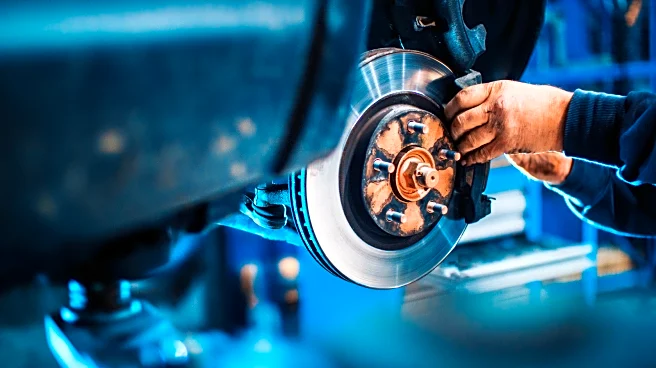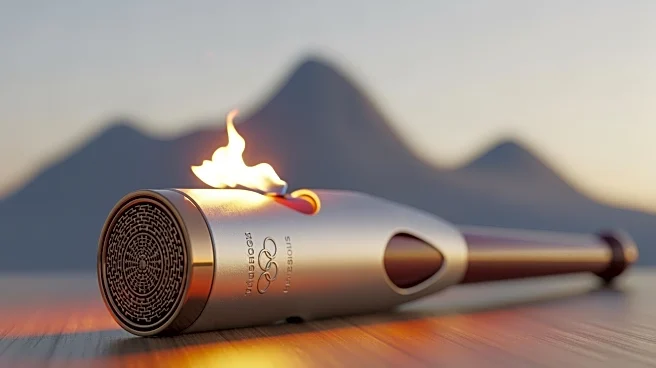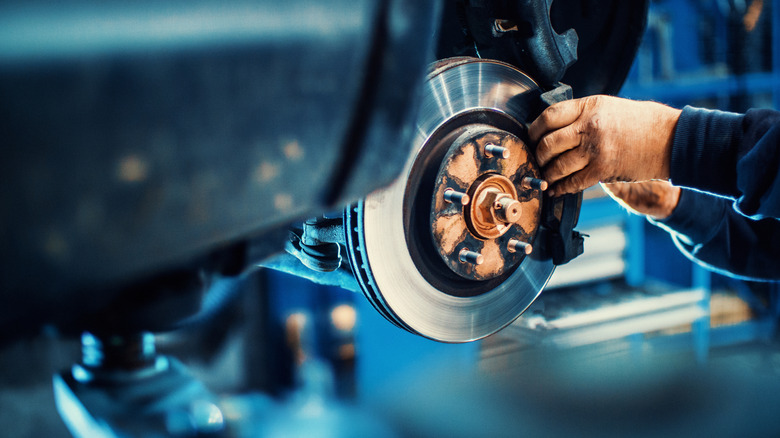
Folks rarely think about their brake pads. They slap them on there and go about their busy lives. However, brakes are an important part of your car, as anyone who saw them cease to work could tell you.
In general, nearly all modern vehicles use disc brakes. The car has brake pads attached to calipers and a rotor underneath. When you engage the brake pedal, it squeezes the calipers, forcing the brake pads to make contact with the rotor. The friction between the two causes your car to slow down and eventually stop. So, when shopping for brakes, you should keep in mind that there are two things that have to be replaced periodically: the brake pads and the rotors. The rule of thumb to swap brake pads is to do so every 40,000 miles of normal driving. That also depends heavily on what kind of brake pad you have, since premium brake pads can last for tens of thousands of miles longer, while cheaper brake pads can fall apart much sooner.
If you're in the market for brake pads and rotors, a good start is to know the who's who of the industry, since those products have stood the test of time and are largely recommended across the Internet by car people and mechanics. The list below is by no means exhaustive, but it should give you a good start on where to look from brands that are widely available.
Read more: Every Major Car Insurance Company Ranked Worst To Best (According To Consumer Reports)
Good: Wagner
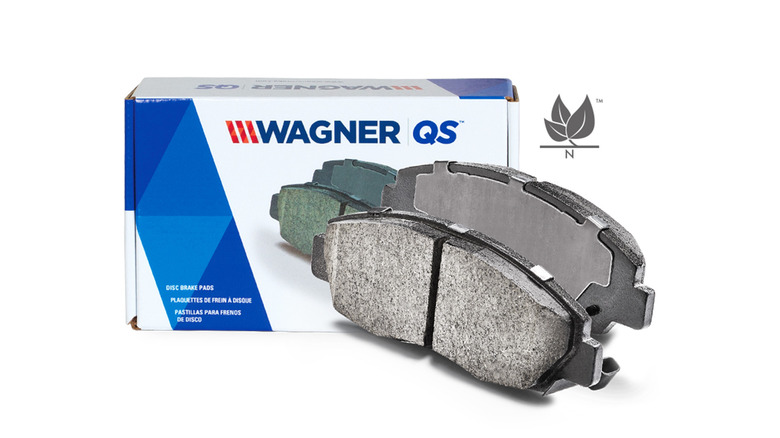
Wagner is a heavy hitter when it comes to brakes. It has consistently been one of the best brake pad manufacturers for as long as it's been around, and you can expect to find some good products of all kinds from this brand. In addition to brakes, Wagner makes lighting products, HVAC equipment like filters, and sensors that help improve car performance. While Wagner isn't generally used in performance applications, it does sell the "Police Pursuit" brake pads that caters to the police. If you've ever seen a high-speed chase before, you'll know how important good brakes can be.
In terms of products, Wagner sells a handful of brake pads along with a rotor option. The brake seems pretty good, since people recommend them on social media and forums all the time. The options available include a general use brake pad, one dedicated to SUVs and trucks, and a version that caters to extreme conditions. The extreme one is mostly made for high-heat applications, such as for trucks that tow heavy payloads.
Wagner's rotors seems to be universal, so you can use them in most application. Wagner sells it sealed in a bag that keeps it from corroding, so you won't have to deal with an oil coating like with other rotors.
Good: Akebono
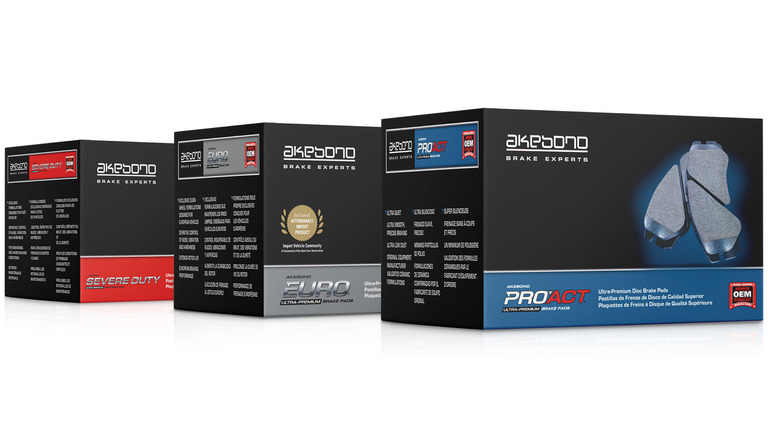
Akebono was one of the names we saw most often when sourcing suggestions from the Internet, and for good reason. When shopping for brake pads, most stick with their OEM (the one that was originally installed on their car), since it is typically the best fit. Akebono is an OE supplier for many automakers, so there's a good chance that it might be your OEM. According to Akebono, the brand supplies parts to Ford, GM, Honda, Isuzu, Mazda, Mitsubishi, Nissan, and many others.
Akebono has three main products for the brake pad market. They include the ProACT pads, the EURO brake pads, and the Severe Duty brake pads. The first two are for daily driving, with the EURO models being somewhat "premium". Severe Duty is made for cargo vans, tow trucks, and other heavier duty vehicles that need to start and stop while carrying heavy loads.
Akebono brake pads might be great, but what about rotors? Well, the brand doesn't have any. Akebono brake pads seem to be usually sold in kits, accompanied by a different brand of rotor. For example, Tire Rack has an Akebono brake pad set that comes with Centric rotors. Akebono seems to only partner with solid brands of rotor, so you can shop with confidence.
Good: Bendix
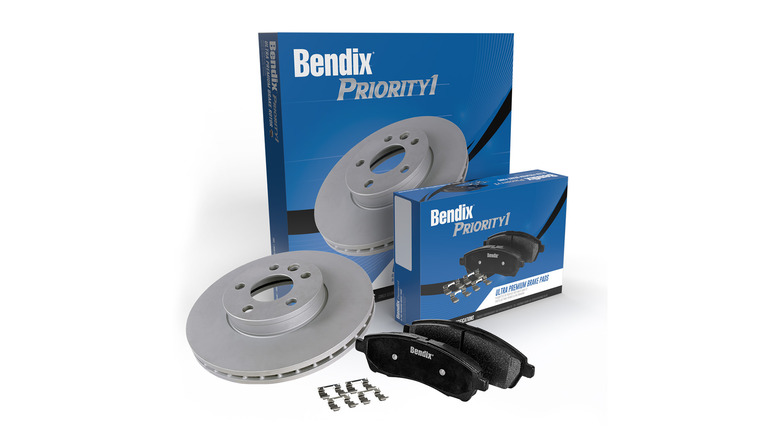
Bendix is another big name in brake pads and, like many of the others, it has its fingers in the OEM brakes game. Bendix supplies parts mostly for commercial vehicles, including heavy-duty trucks, tractors, and buses. Bendix has been around for quite a long time, and even supplied OEM brakes to GM for a while. We're not sure if they still do, but since the brand has been in business since the 1880s, it's reasonable to suspect that they still supply to some automakers.
Bendix has a trio of brake pad options, along with some brake rotors. Like other brake makers, Bendix has two main product lines. The confusingly named "Premium" brake pads are the least expensive of the bunch and boast either ceramic or semimetallic formulas along with other features, while the Priority1 line is the more expensive option. For the added price, it includes extras like noise-elimination shims and a more robust friction material. Finally, in keeping with its favorite market, Bendix has the FleetMetlock brand designed for the rigors of commercial vehicle use.
Reviews and recommendations for Bendix are in line with the other brake makers on this list. That is to say, the brand is frequently recommended and its products are often available both in-store and from online retailers, making them easy to find. We didn't see Bendix recommended quite as often as Akebono, Wagner, and some others, but based on the reviews we could find, they all appear to be quality brands.
Good: Bosch
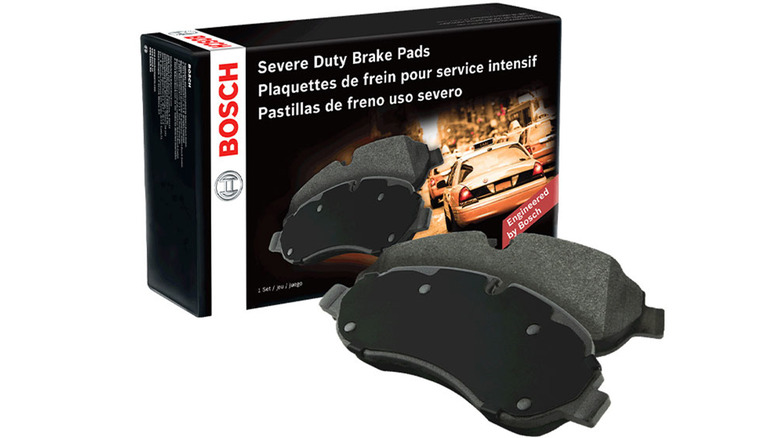
Bosch makes a lot of things, and it tends to make them pretty well. This is one of the best brands of refrigerators and a maker of great power tools, but one of the biggest sectors for the company is auto repairs. Bosch makes diagnostic tools, wiper blades, brakes, and various engine parts. It's also one of the larger OEM part makers for pretty much every automaker you know of, including fleet vehicles like semi-trucks.
Bosch's brake pads and rotors are considered to be pretty good. The company has two main lineups of brake pads: the budget-friendly Blue pads and the premium QuietCast Premium. The company also sells a standard brake rotor, meaning you can swap your entire brake system for a Bosch one if you prefer. While most companies on this list have similar offerings, this company also makes QuietCast Medium Duty and Severe Duty brake pads, as well as sets designed specifically for police cruisers, giving Bosch more options than its competitors.
In terms of quality, Bosch gets the same love that Akebono does as a purveyor of OEM parts. OEM parts are generally considered the best option for daily use, and Bosch makes a lot of them.
Good: Raybestos
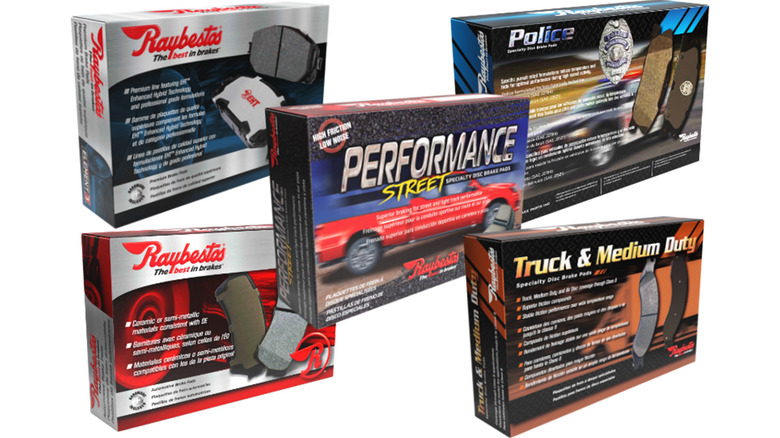
Raybestos is a brand that you might be unaware of, but it's been around for over a century. The company was founded in 1902, and it has been making brakes the whole time. Raybestos is based out of Illinois, so those looking for U.S.-made parts can start here. It's also one of the few companies on here that doesn't make OEM parts. However, its products are designed in the same style as original equipment parts, so they should mostly be safe to use on your vehicle.
Raybestos has nearly a dozen brake pads and rotors to choose from, which can make things confusing. Thankfully, the company organizes its braking products in a list that tells you the construction materials and other details about each product. Regular users will want to get the Element3 or R-Line pads for their car or SUV. There is also a selection of pads for police, trucks and medium-duty commercial vehicles, and performance vehicles. Each brake pad also has an associated rotor, so you can easily match one part to the other.
The general consensus is that Raybestos is one of the best of the mid-tier brake pad makers. Its options aren't particularly expensive, while being a step up from no-name companies on Amazon. In short, they're not Akebono or Bosch, but they're definitely still good.
Good: Centric
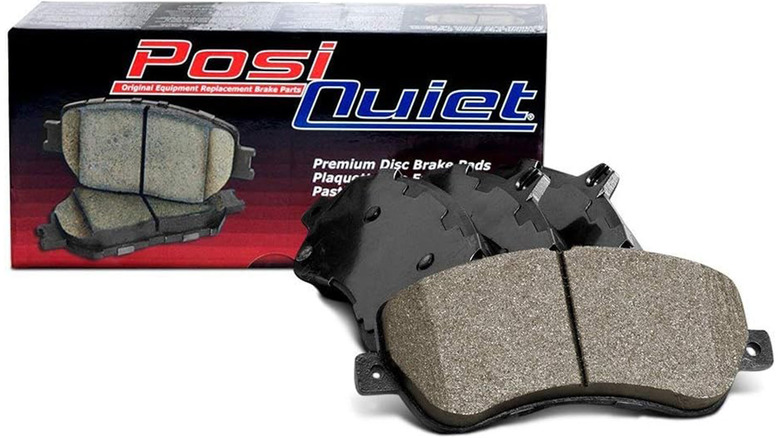
Centric is one of the youngest auto parts makers on the block. It was established in 2000, making it 25 years old at the time of this writing. Like Raybestos, it doesn't make any OEM parts, but it does make a smattering of aftermarket parts for consumer and commercial vehicles, including trucks and fleet vehicles. In addition to pads and rotors, Centric also makes calipers, hub assembly parts, and hydraulic brake components.
Centric has a few brake pad and rotor lineups to consider. The Posi Quiet and Posi Quiet XT are the brake pads of choice if you're a regular user, while the Centric Premium, CTek, and GCX rotors should fit most other use cases. Centric also sells the StopTech lineup, which is a complete braking system designed for track and performance use. Pricing varies quite a bit, with the brand's most basic brake pads going for about $20 while the higher-end models like the Posi Quiet pads ranging upwards of $50, depending on where you buy them.
Centric has its fans, just like the other brake pad companies, and that's why they're often listed as the best in the industry alongside Akebono and Wagner. Plus, if you look on places like Tire Rack, you can find Centric rotors paired with Akebono brake pads. They wouldn't pair them if the two weren't of comparable quality, wouldn't they?
Bad: Unbranded Products On Amazon Or eBay
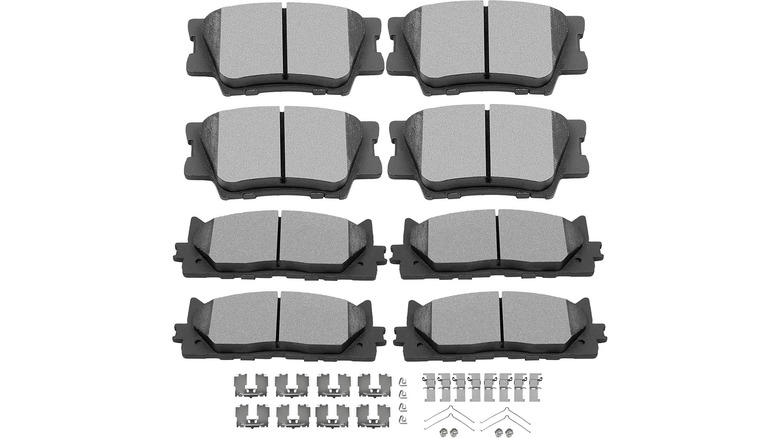
We could have listed some random no-name brands from Amazon, eBay, and other online retailers as the worst brands to avoid, but instead we're going to talk about the lot of them as a group. Here's the rub: The brake pads sold by these unknown companies aren't necessarily bad, but you have no way of knowing if they're good, and they're probably not the same kind of quality as any reliable brand on this list. They are often made with cheap materials and low standards, which is why they're so inexpensive.
Will they stop your car? Yes. Will they also wear out faster and stop you less efficiently than products from larger, more well-known brands? Also, yes. Ultimately, that's the trade-off: you spend less now, but you'll spend more by having to replace them all the time. When researching the article, the number one recommendation we found was essentially avoiding the no-name brands on online retailers as much as possible, so we're passing that advice onto you.
There are tons of other reasons to avoid random braking pad companies. Essentially, if it's a brand you don't know, Google it. If you can't find anything about it, or if you only find bad reviews, you should probably avoid it. Brake pads are responsible for stopping your multi-ton vehicle when it's going 80 mph. You should probably find something else to save a few bucks on.
Bad: Organic Brake Pads
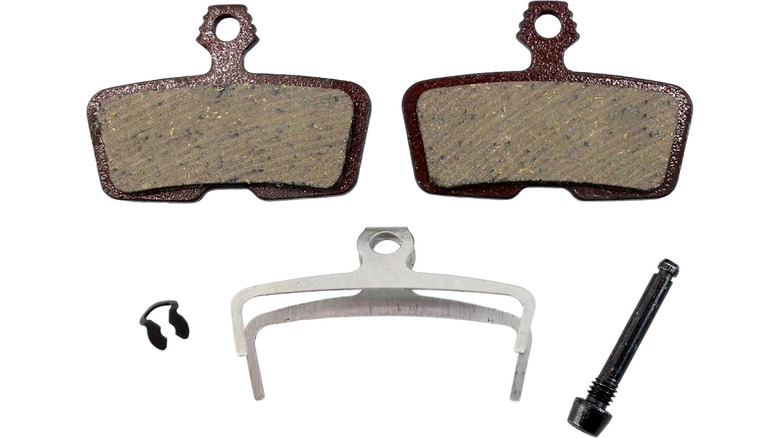
Organic brake pads are known as one of the worst options of brake pad materials, as they are unreliable and degrade faster than other options. They are typically made from materials like glass, rubber, resin, and kevlar, all bonded together. While they have some advantages (they're quieter than other formulas, for one) they have bad stopping performances and break easily. Organic brake pads used to be common, but are slowly being phased out by the advance of ceramic and semimetallic friction materials.
Organic brake pads generate a lot more brake dust than ceramic or metallic materials, which can make your wheels look dirty. They're quiet and friendly for rotors, but don't last nearly as long as ceramic or semimetallic materials. They also don't work nearly as well in extreme hot or cold, making them less reliable for folks who experience harsher winters and summers. In short, organic pads aren't bad as much as they are old tech, and newer technology has long since surpassed them in every way except in noise levels and price. One could guess that most drivers would prefer a brake that stop fast but makes a bit more noise, and you probably will, too.
Bad: Any Budget Range
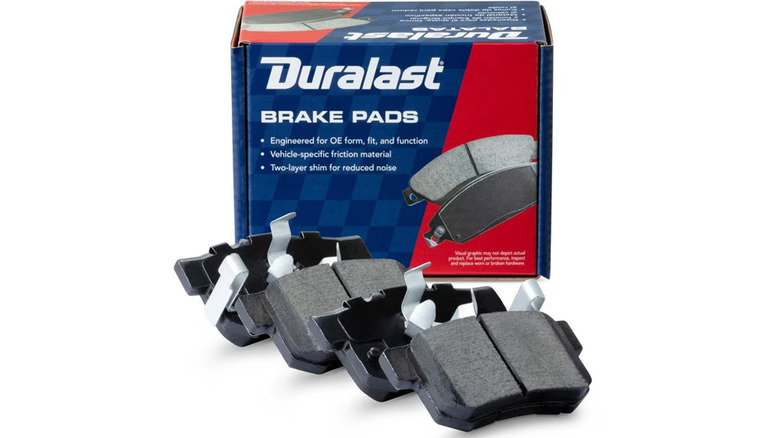
Most brake pad makers have different tiers of brake pads, and those different tiers accomplish different goals. Usually, the higher you go, the more you get. That includes more longevity, more premium friction materials, less risk of brake fade, less brake dust, and better stopping power. Of course, some high-end pads are just too much for the average user. At the same time, many budget options simply don't offer enough for daily drivers.
One great example is AutoZone's Duralast brakes. AutoZone has a whole FAQ about which tier to get, where the brand recommends that anyone looking to use their car more than the bare minimum skip its budget tier. Sure, this could be just marketing, but it's consistent with experts' opinions. Educational YouTube channel Engineering Explained compared various tiers of brake pads in a video and found that the budget-oriented ones not only performed worse, but wore out substantially quicker than even medium-tier brake pads.
So, we recommend you avoid going for cheap or budget options, even with reputable brands, and head for the medium tiers instead, since they usually have much better longevity and performance.
Bad: Situational And Niche Use Cases
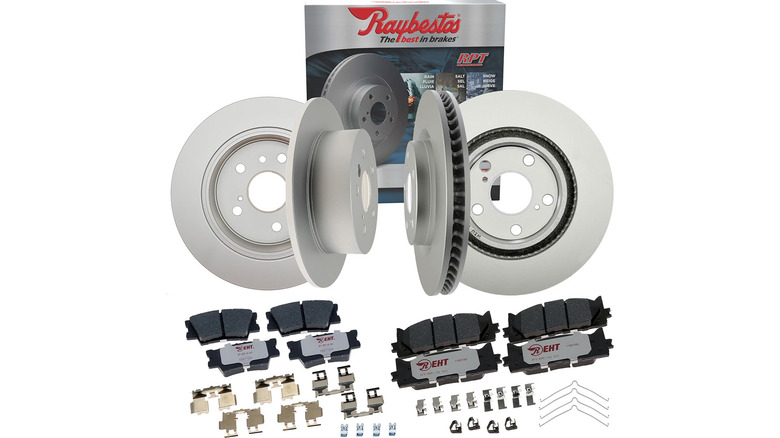
This isn't really about brands to avoid, but you should know it anyway. In addition to avoiding no-name and budget brake pads and rotors, you should avoid buying stuff you don't need. For example, if you don't own a race car, you don't need racing brakes. It would be like buying a semi-truck to drive your kids to school. You can do it, but it's entirely unnecessary. This Engineering Explained YouTube video comparing braking pads might make the case for getting the mid-tier versions, but it also highlights how little difference there is between mid- and high-tier pads.
This is highly dependent on where you live and how you drive. People with regular cars that drive like regular people can get a good, medium-tier ceramic brake pad and call it a day. However, if you drive a larger truck for work and typically carry heavy loads, you'll want to step up your brake pad and rotor to something a little more sturdy, which is why most brands have a heavy-duty variant of their brake pads. Similarly, performance brake pads tend to resist brake fade better, a common issue in racing that barely affects regular drivers.
Weather can also play a role. Colder climates may make ceramic brakes and performance brakes less effective, necessitating a different friction material for optimal stopping power. If your use case is unusual, it's worth looking around to make sure the brakes you choose will suit your driving conditions.
Want the latest in tech and auto trends? Subscribe to our free newsletter for the latest headlines, expert guides, and how-to tips, one email at a time.
Read the original article on SlashGear.
